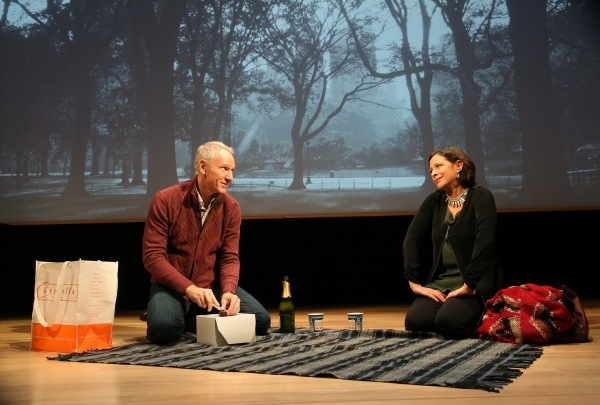A Second Chance

(© Joan Marcus)
For those who enjoy perusing theater programs or the liner notes of cast recordings, the name Ted Shen may seem more familiar in the context of the Ted & Mary Jo Shen Charitable Gift Fund. Since the ex-investment banker entered the world of not-for-profit theater in 2002, the foundation has been a financial godsend to some of the most innovative musical theater artists in the industry today. Continuing along the trajectory of this unorthodox career shift, the professional angel has now flown his own inaugural work, A Second Chance, onto the Shiva stage at the Public Theater for its New York debut.
Shen has taken the old Mark Twain adage "write what you know" to heart for his first creative project. The two-person musical, starring real-life married couple Brian and Diane Sutherland (who premiered the show at Virginia's Signature Theatre in 2011), is based on the evolution of Shen's relationship with his current wife, Mary Jo. The pair takes on the first-name-only characters of Dan — a banker and recent widower with a yen for architecture — and Jenna — a divorcée in search of head-over-heels love.
There's no doubt we've landed in the wealthy part of New York City for this love story, illustrated by Robert Brill's simple yet sleek set design comprised of a few white chairs and what look like blank white canvasses on the three surrounding walls. The canvasses house a variety of black-and-white images that set the scene, beginning with the cocktail party at which Dan and Jenna first lock eyes. After a second happenstance encounter on a New York subway, they strike up a relationship that traverses the inevitable ups and downs of two people who are self-proclaimed "damaged goods."
The show forgoes traditional dialogue for nearly 100 minutes of songs and sung conversation that all blend together into a hodgepodge of indistinguishable tunes, infused with a scent of piano bar jazz. A vocal opponent of the pop music trend in today's musical theater, Shen has unabashedly modeled his score after the abstract style of his artistic idol, Stephen Sondheim — Broadway's reigning godfather with an intangible gift of making the simple profound, the trite hearty, and the un-hummable…hummable. From the first notes, you hear echoes of his marriage-themed musical Company and the patter of its lovably neurotic and deeply complex characters. Unfortunately, these echoes go no further than the sounds of an admirer's feeble attempt at mimicry.
Shen himself has professed his preference for "action songs" as opposed to "introspection songs" that typically give performers three minutes of uninterrupted time to croon their inner thoughts and feelings with a melodic ballad or witty showstopper. He admirably holds steadfast to his determination to veer away from the mind-numbingly-formulaic musical that rears its ugly factory-made head on all too many Broadway stages. However, somewhere along this campaign for originality, Shen has thrown out the baby with the bathwater, eliminating introspection altogether.
As Jenna and Dan flirtatiously ping-pong back and forth about watching Mad Men and taking the long trek from Manhattan to Brooklyn, we learn as much about them as anyone would from dating small talk. The only deeper information we gather from the pair comes from a series of direct statements about the source of their romantic reservations — Dan's stemming from the guilt that comes with moving on from the loss of his deceased wife and Jenna's from the overpowering feelings of inadequacy that come with living in her shadow (feelings she periodically spells out for us during therapy sessions).
Both Brian and Diane Sutherland are talented performers who make the most of the material they are handed, as does director Jonathan Butterell who seems to allow the actors' preexistent rapport to speak for itself. Diane is compassionate and warm, a perfect match for any grieving man, while Brian is just the charmer to inspire a little self esteem in a wounded woman — though his grief does come across as a little too stale considering the freshness of his emotional trauma.
Considering the spoiler in the title of Shen's foundation, it's no surprise that Dan and Jenna overcome their respective psychological roadblocks and find their second chance at love in each other's warm embrace. The sweet story satisfies our craving for a happy and tidily resolved ending — one detail certainly not on loan from a Sondheim musical — however, it fails to add the meat necessary to make it a compelling piece of theater. Still, as a first venture into the creative side of production, the skeleton underneath shows glimmers of promise. After all, as Shen knows better than anyone, "art isn't easy."











